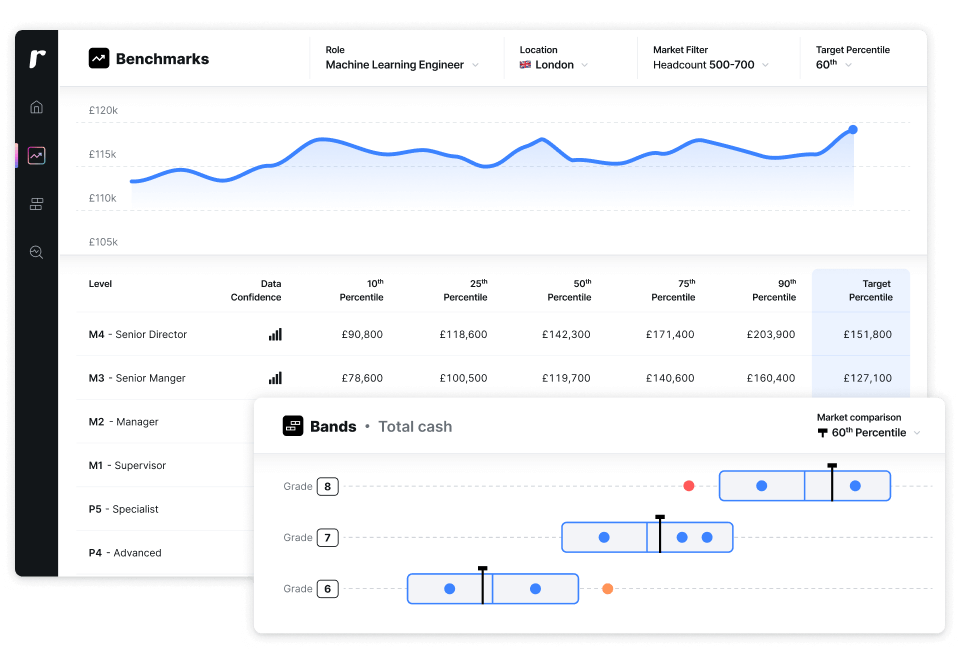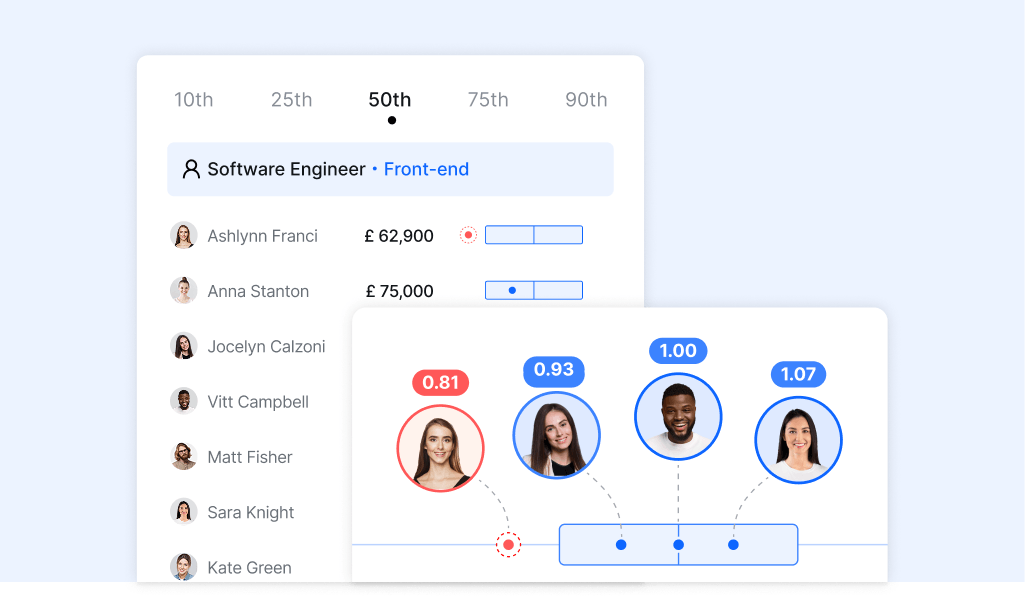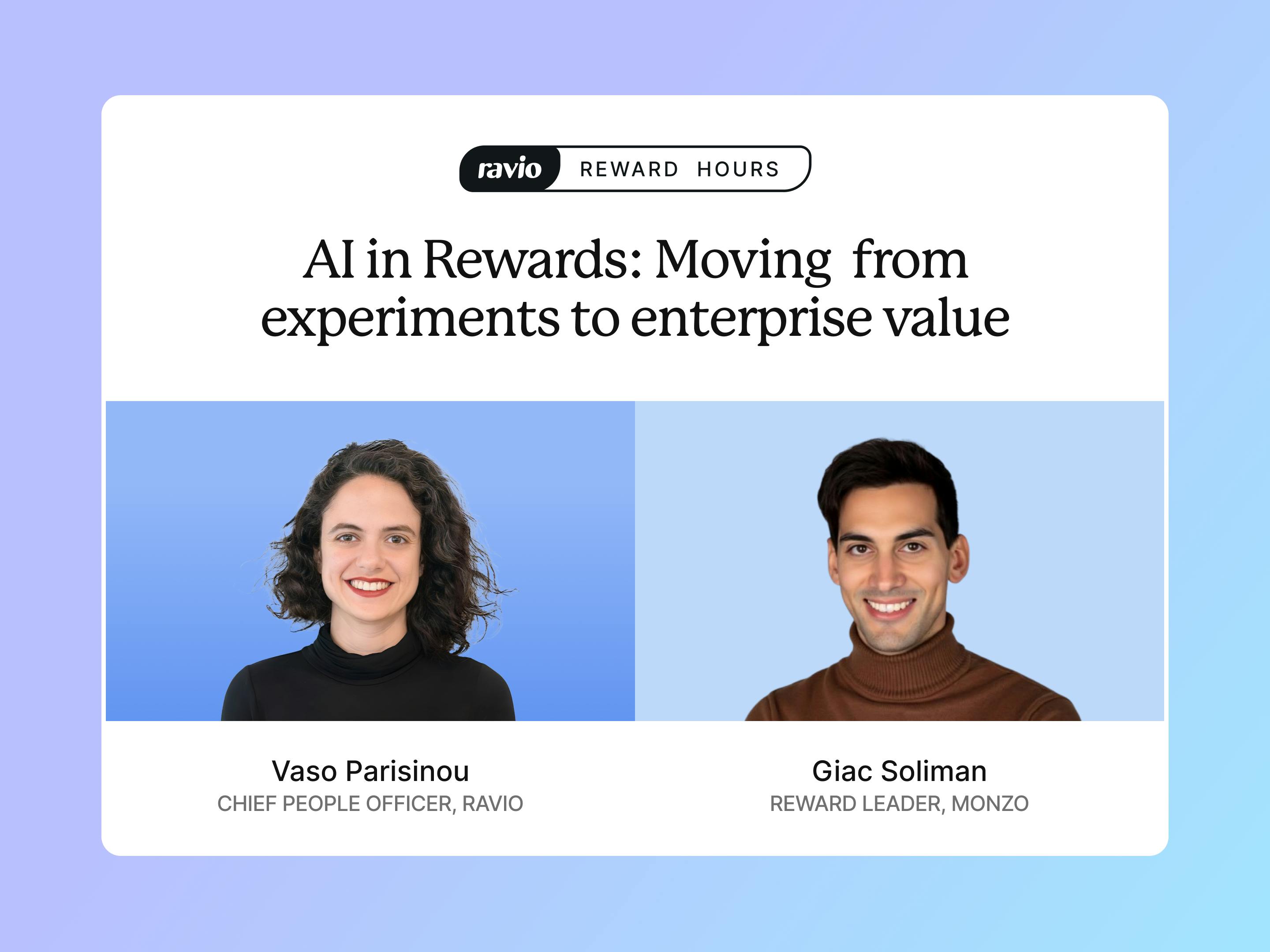- What makes the best compensation management software?
- The best compensation management software at a glance
- 1. Ravio
- 2. Pave
- 3. Beqom
- 4. Compa
- 5. Compport
- 6. Payscale
- 7. CompAnalyst by Salary.com
- 8. HiBob
- 9. Lattice
- 10. Workday
- Why Ravio is the best compensation management software for tech companies
- Frequently asked questions
The best compensation software gives you accurate, up-to-date benchmarks tailored to your industry and region, streamlined workflows, and built-in pay equity compliance — minus the admin drag.
And finding the perfect fit shouldn’t be a tedious process.
Depending on your needs, you might choose a purpose-built compensation platform with HRIS integration, a broad HR suite with basic comp management features, or a tool that gives you workflows but no native benchmarking data.
When shortlisting, go beyond price tags — check how quickly you can run compensation reviews, which systems the platform integrates with, and whether it has the coverage for the markets and roles you hire in.
This guide will help you do just that:
- Understand what makes the best compensation management software
- And review 10 best compensation management platforms in 2026
So you can make compensation decisions that your board, managers, and employees trust.
What makes the best compensation management software?
The best compensation management software brings together real-time market data, salary band management, compensation review workflows, and pay equity compliance in one platform.
To deliver on this, it should offer the following four must-have capabilities:
- Compensation benchmarking data: Gives you real-time, peer-relevant market data across total rewards (salary, variable pay, equity, benefits) that keeps benchmarks accurate and supports competitive positioning across job roles, levels, and locations.
- Salary bands: Lets you create, visualise, and maintain structured compensation bands with automatic updates and transparency, ensuring scalability and fairness as your company grows.
- Compensation reviews: Replaces spreadsheets with streamlined workflows that manage merit cycles end-to-end — delivering faster, fairer pay reviews with less admin work.
- Pay equity compliance: Helps you identify pay gaps, calculate remediation costs, and generate compliance reports with built-in analytics, supporting pay equity and regulations like the EU Pay Transparency Directive.
When comparing providers, look for tools that balance these robust features with ease of use, fast time to value, and up-to-date, peer-relevant data — especially if you’re preparing for a compensation review cycle or compliance initiative.
The best compensation management software at a glance
When evaluating different providers, you’ll come across three main types of compensation management solutions:
- Purpose-built compensation management platforms (like Ravio, Pave, Beqom) are designed specifically for comprehensive compensation management. They differ in data sources. Some, like Ravio, have built-in compensation databases. Others, like Beqom, rely on third-party surveys and some, like Compport, focus only on workflows without their own data.
- HRIS platforms with compensation features (like Workday, HiBob, Personio) are broad HR suites with basic compensation tools. These offer the benefit of integration across HR functions, but they typically lack the depth and flexibility of dedicated compensation platforms.
- Traditional salary survey providers and consultants (like Mercer, Radford, Willis Towers Watson) are consultancy-led providers that deliver annual survey data for benchmarking. While trusted for credibility, their solutions involve manual submissions and limited software capabilities.
Here’s a snapshot of the leading compensation management tools in 2026, with a deeper look at each one just below:
Platform | Compensation data methodology | Best for | Primary limitation | Free trial available? |
|---|---|---|---|---|
Ravio | HRIS and ATS integrations + option to upload additional data sources | Global tech (or tech-enabled) companies | Dataset is strongest for tech (or tech-enabled) companies, so not best fit for companies with few tech roles | Yes – see sample data instantly |
Pave | HRIS integration | US tech companies | Limited benchmarking data outside of the US and Canada | Yes – access to US benchmarks and one other location of choice |
Beqom | HRIS integration (limited dataset) + third-party survey data (several sources) | Large global enterprises with complex incentives | Primary focus is compensation workflow tools, benchmarking data relies on lagging third-party salary survey data | No |
Compa | HRIS and ATS integrations | US tech companies focused on hiring | Primary focus is offers-based ATS data – limited workflow tools | Yes – free analysis report for one role of choice |
Compport | No data provided, user can upload from other sources | Asia-Pacific enterprises | Users report a complex user experience | No |
PayScale | Salary surveys – Payscale’s own and third-party survey data (several sources) | Large global enterprises | Users report complex product offering and unintuitive software | Yes |
Salary.com (CompAnalyst) | Salary surveys – Salary.com's own and third-party survey data (several sources) | Large global enterprises | Traditional survey methodology rather than real-time data | No |
HiBob | Third-party survey data (Mercer) | Companies already using HiBob as HRIS whose priority is all-in-one HR suite | Lack of depth and functionality with compensation as an add-on module, plus reliance on lagging third-party salary survey data | No |
Lattice | Third-party survey data (Mercer) | Companies already using Lattice as HRIS whose priority is all-in-one HR suite | Lack of depth and functionality with compensation as an add-on module, plus reliance on lagging third-party salary survey data | No |
Workday | No data provided, user can upload from other sources | Large global enterprises with complex needs, who are already using Workday as an HRIS | Lengthy and resource-intensive implementation due to the complexity and configurability of the platform | No |
1. Ravio
Ravio is a dedicated compensation management platform that combines real-time global total compensation benchmarking data with tools for salary bands, pay reviews, and equity compliance.
It’s best suited for high-growth, global tech companies that require accurate, up-to-date global data, with especially strong coverage across Europe.

Ravio’s strengths:
- Covers all core compensation needs with end-to-end tools for benchmarking, salary bands, and pay equity compliance.
- Delivers reliable, real-time global market data with especially strong coverage in Europe, sourced directly from 1,400+ companies via HRIS and ATS integrations to keep benchmarks accurate and up to date. You can also import third-party data if needed.
- Gives you total compensation data covering salary, equity, variable, benefits (PTO, parental leave, and wellbeing budgets) benchmarks alongside advanced filters to compare your pay structures against relevant peer groups.
- Provides an exceptional user experience with fast onboarding, automated job mapping, and an intuitive interface that People leads like Maartje Koopman from Tiqets credit for saving their team’s time: “We’ve added so much time back into our day-to-day now that we have Ravio as our go-to benchmarking provider.”
Ravio’s limitations:
- Tech-focus. Ravio specialises in total rewards benchmarks for tech and tech-enabled companies — valuable for high-growth firms, but less relevant for organisations with few tech roles.
Ravio reviews
Ravio maintains a 4.7/5 G2 rating, with existing customers including established tech companies like Bolt, Wise, Finastra, and Octopus Energy.
In 2025, Ravio announced a €10.6M Series A funding round, highlighting the company’s 400% ARR growth – demonstrating strong market trust, a signal of stability for teams adopting the platform.
Ravio pricing
Ravio’s pricing depends on company size, selected modules, and market data needs, with pricing for a 500-person company starting at £5,000 per year.
Ravio also offers 3 free benchmarks so you can easily evaluate the software and see if the data fits your needs.
“Using Ravio has been a game-changer for our compensation philosophy and strategy at Tellent. It provides valuable insights into the competitive market and has allowed us to take a big step toward achieving fair, transparent, and competitive pay across the company.”

Tellent
2. Pave
Pave is a compensation management platform that combines real-time benchmarking data (salary, equity, variable pay) with tools for salary bands and compensation reviews.
It’s best suited for US and Canadian companies — from startups to large enterprises — in tech, healthcare, and gaming that require accurate North American benchmarks.
Pave’s strengths:
- Meets three core compensation needs with tools for salary bands, benchmarking, and compensation review planning, plus basic pay transparency features.
- Provides real-time global benchmarks with strong US and Canada coverage sourced from 8,000+ companies via HRIS integrations. Pave also lets you import third-party data.
- Delivers total compensation benchmarks across base salary, equity, and variable pay, though coverage outside North America is limited to base salary.
Pave’s limitations:
- No pay equity capabilities (no built-in equity analysis or compliance tools).
- US-focused data with limited global coverage, which means weaker data for Europe and other regions.
- No benefits benchmarking so no insights on PTO, parental leave, or wellbeing budgets.
- Lacks market trend insights with no data on new hire benchmarks, hiring rates, attrition, or average salary increases.
Pave reviews
Pave has a 4.7/5 G2 rating, with users praising the team’s responsiveness but reporting that “Pave’s market benchmarks are not as granular or reliable as other sources.”
Pave pricing
Pave’s pricing is custom and is not publicly available. A free trial is available for market data access, but limited to ‘overall US’ (i.e. a blend of markets) and one other location of choice.
3. Beqom
Beqom is a compensation management platform that offers tools for salary management, compensation reviews, and pay equity compliance – but no proprietary, real-time benchmarking dataset.
It’s best suited for global enterprises operating across multiple sectors that have the resources to aggregate multiple data sources.
Beqom's strengths:
- Offers global enterprise compensation capabilities with support for complex compensation structures, including sales commission management, long-term incentives, and deferred payments.
- Provides benchmarking data across 100+ countries by aggregating customer submissions and integrating with third-party, traditional survey providers like Mercer and Radford.
- Supports global pay equity compliance with tools to generate standardised reports across countries.
Beqom's limitations:
- No proprietary real-time dataset as Beqom relies on third-party salary survey providers whose data can be error-prone and outdated.
- Complex implementation that users say is backed by an unintuitive setup and poor customer support. G2 also highlights Beqom takes 9 months to implement.
- Complex for small and mid-market companies, as Beqom is geared toward large enterprises and lacks the simpler, structured starting points smaller teams need.
Beqom reviews
Beqom has a 4.4/5 G2 rating. Users appreciate the complex capabilities of Beqom's platform, but note that this brings complexity challenges, with one reviewer sharing: “The flexibility of the Beqom system can be a double-edged sword with higher complexity leading to higher risk of user errors.”
Beqom pricing
Beqom does not have a publicly available, transparent pricing structure.
4. Compa
Compa is primarily an offers-based compensation tool that provides real-time offer data through ATS integrations and benchmarking data through HRIS integrations, but no compensation management tools.
It’s best suited for US enterprises in tech, life sciences, and retail that want to supplement traditional salary survey data with real-time offer insights.
Compa's strengths:
- Specialises in real-time offer data and current market trends sourced from ATS integrations to surface insights from live job offers.
- Provides compensation benchmarks for hourly workers including hourly wage data, making it especially useful for companies with shift workers on the teams.
- Delivers a modern software experience built by ex-Mercer professionals to rival traditional survey providers with a more intuitive approach.
Compa's limitations:
- No compensation management functionality as Compa primarily focuses on offers data.
- Not fully accurate compensation benchmarking given Compa’s offer data excludes existing employee salaries and is limited to high-volume roles that appear regularly in ATS systems.
- Data lacks relevance for smaller organisations as Compa’s benchmarks are primarily geared toward large global enterprises.
Compa reviews
At the time of writing this, Compa does not have any G2 user reviews. We also looked it up on Capterra, but found nothing.
Compa pricing
Compa pricing starts at £26,000 ($35,000) annually. Users can request one free analysis report for any role of their choice to see if the data is relevant.
5. Compport
Compport is a compensation management software that gives you tools for salary band and compensation reviews — but no native benchmarking data.
It’s best suited for global enterprises, covering industries like oil and gas, manufacturing, and pharmaceuticals in the US and APAC region.
Compport's strengths:
- Offers a modular platform that lets organisations flexibly configure compensation structures and processes, using their own internal benchmarking data.
- Supports global enterprise needs with compensation management capabilities tailored for large companies, including worldwide pay equity compliance.
Compport's limitations:
- No compensation benchmarking data offering only workflow management without market insights .
- Difficult to use with reviewers complaining of navigation challenges and limited integrations that leave many tasks manual.
- Accessible only to large enterprises, as the complex feature set and implementation requirements make it unsuitable for growth-stage companies that need rapid deployment.
Compport reviews
Compport has a 4.7/5 G2 rating with users praising the detailed level of analytics available, but highlighting that tech support can sometimes take a “longer time to resolve the queries.”
Compport pricing
Compport does not have any publicly available pricing information.
6. Payscale
Payscale is a compensation data provider that combines benchmarking data from third-party surveys, employer submissions, and employee crowdsourced data with separate software products for basic compensation tools and survey participation management.
It’s best suited for companies looking to consolidate multiple data sources and manage complex survey participation in one platform.
PayScale's strengths:
- Supports global enterprise compensation needs with MarketPay, designed to handle complex, enterprise-level structures.
- Aggregates multiple data sources by integrating with third-party salary survey providers like Mercer, Radford, and Willis Towers Watson, along with company HRIS systems to create its own dataset.
- Offers survey participation tools that let companies manage and submit salary survey data in one platform, reducing administrative burden.
PayScale's limitations:
- Complex and overlapping product options that create a confusing selection process.
- Doesn’t automate job matching, forcing users to map internal roles and levels to Payscale’s market data – a time-consuming process prone to error.
- Misses key compensation management tools with no salary band tooling or pay equity compliance support.
- Remains complex to use, reflecting PayScale’s roots as a survey provider rather than a software-first platform.
Payscale reviews
Payscale has a 4.2/5 G2 rating for its compensation management product, Payfactors and 4.4/5 for its benchmarking tool, Marketpay. Users praise the comprehensive feature set, but point out certain features need work. For instance, this user shared, “It is really hard to price multiple jobs in single click which makes it had to use for large organisations with presence in multiple countries or regions.”
Payscale pricing
Payscale has custom pricing tiers, with no transparently available pricing indicators. A free trial is available with basic functionality. Payscale and Marketpay are available for purchase separately.
7. CompAnalyst by Salary.com
CompAnalyst by Salary.com is a compensation management platform that aggregates benchmarking data from third-party survey providers with piecemeal solutions for salary band management, pay reviews, and equity compliance.
It’s best suited for US-based enterprises with complex compensation structures and the internal resources to manage implementation, rollouts, and training.
Salary.com's strengths:
- Provides global HR-reported compensation data through Salary.com’s salary surveys, supplemented by SalaryIQ job market intelligence that scans job boards and career sites for advertised pay ranges.
- Offers survey participation tools that let companies manage and submit salary survey data in one platform, reducing administrative burden.
Salary.com's limitations:
- Lacks real-time HRIS integration for benchmarking data, relying instead on survey submissions that give error-prone, out-of-date insights.
- Unreliable benchmarking insights as one of CompAnalyst’s data sources is user-reported insights from job adverts and career sites, which lack verification and are often based on outdated averages
- Offers limited coverage in some markets, industries, and roles with a dataset skewed toward large global enterprises.
- Piecemeal compensation management solution with a confusing selection process, as multiple datasets and tools create unnecessary product complexity. For non-enterprise customers, the steep learning curve can be a blocker.
Salary.com reviews
Salary.com has a 4.4/5 G2 rating overall and a 4.5/5 rating for its compensation planning software, CompXL. Users commend the comprehensive featureset, but report that the software setup isn’t smooth and implementation support isn’t sufficient: “We encountered several challenges and would have greatly appreciated more test scripts and guidance from our implementation lead.”
Salary.com pricing
Salary.com does not have any publicly available pricing information.
8. HiBob
HiBob is a broad HR platform that combines salary benchmarks from Mercer and other third-party providers with basic compensation management tools alongside HR tools for recruitment, performance, and payroll management.
It’s best suited for SMBs with simple compensation needs that want to manage pay decisions directly within their performance and HR platform.
HiBob's strengths:
- Provides basic compensation management tools for salary band management, pay equity analysis, and compensation reviews.
- Offers a unified people management ecosystem that encourages organisation-wide adoption and makes basic compensation management accessible alongside other HR processes.
- Facilitates global compliance operations with multi-currency functionality and compliance expertise for international teams.
HiBob's limitations:
- Basic compensation tooling since comp management is only one module within the larger HiBob HR platform, lacking the depth and visibility many teams require.
- No real-time benchmarking data, and instead depends on third-party survey data via Mercer – making benchmarks error-prone and often outdated, as is common with traditional salary surveys.
HiBob reviews
HiBob has a 4.5/5 G2 rating for the HRIS system overall – but users of the compensation module specifically highlight that it “still has a long way to go before it can fully support complex pay structures and processes”.
HiBob pricing
HiBob operates on custom pricing, with no pricing publicly available.
9. Lattice
Lattice is an all-in-one HR platform that combines benchmarking data from third-party providers with basic compensation management alongside HR tools like performance management, employee analytics, OKRs, and employee engagement.
It’s best suited for mid-market teams that need basic total compensation coverage within a wider people platform.
Lattice's strengths:
- Unifies multiple people processes with compensation included as an add-on module.
- Helps across three core compensation management areas with tools for salary band management, equity analysis, and review workflows integrated with performance cycles.
- Offers a manager-friendly experience with guided workflows, intuitive tools, and a contemporary interface.
Lattice's limitations:
- Limited compensation functionality as Lattice is a broad HR platform, not a dedicated compensation platform with specialised features. Available compensation tools are basic.
- Relies on third-party survey data through a Mercer integration that updates annually rather than in real-time. Mercer dataset is particularly weak for growth-stage and private tech companies, especially in smaller European markets.
- Missing market intelligence with no live market trends, hiring rates, and attrition data essential for competitive compensation decisions.
Lattice reviews
Lattice has a 4.7/5 G2 rating as a whole platform. However, compensation-specific feedback reveals challenges, with users complaining of limited benchmarking options and integration issues.
Lattice pricing
Lattice pricing starts at £8 per seat ($11 per seat) per month for the talent management suite and about £7 ($10) per seat per month for the HRIS, with the compensation add-on priced at about £5 ($6) per seat per month. There is a minimum annual spend of £3,000 ($4,000).
10. Workday
Workday is a human capital management platform that combines customer-aggregated benchmarking data with select real-time insights from its Compa integration, alongside compensation management features and HR tools for recruitment, payroll, and performance management.
It’s best suited for large global enterprises looking for a single platform that brings together HR, finance, and talent management.
Workday's strengths:
- Offers enterprise-grade tools for three core compensation needs: salary bands, compensation reviews, and pay equity analysis.
- Provides a comprehensive HR platform that unifies HR, finance, payroll, and compensation in one robust system, ideal for global Fortune 500 companies managing complex HR requirements.
- Supports deep integration between compensation, performance, talent management, and succession planning.
Workday's limitations:
- Lacks pay equity capabilities with no built-in pay equity analysis or compliance tools.
- No proprietary benchmarking data, instead relying on users to source, manually import, and map external survey data, which adds administrative burden.
- No comprehensive real-time insights, even with the Compa partnership, it misses live market trends, hiring rates, and competitive intelligence needed for modern compensation decisions.
- Complex implementation with users reporting the need for expensive consultants and 3-6 month deployment timelines.
- Accessible only to large enterprises that can bear high implementation costs and licensing complexity.
Workday reviews
Workday has a 4.1/5 G2 rating for the overall platform, with users repeatedly highlighting “costs” and “implementation time” as the biggest shortcomings. Users also report unintuitive navigation — with one saying, “The layout isn’t always intuitive, and you sometimes have to click through several menus just to complete a simple task.”
Workday pricing
Workday offers custom pricing, with no pricing information publicly available.
Why Ravio is the best compensation management software for tech companies
If you’re a high-growth, global tech company with a strong presence in Europe, you’ll find Ravio gives you the optimal mix of reliable data, comprehensive compensation management tooling, user-friendly technology, and expert support on hand to help.
Unlike enterprise platforms that require months of implementation or compensation tools that rely on third-party data, Ravio delivers reliable, relevant, real-time market data and purpose-built compensation management workflows.

On the whole, here’s what to expect from Ravio:
- Real-time compensation intelligence: HRIS and ATS integrations make sure data reflects current market conditions, not outdated and error-prone survey snapshots. This lets you create a proactive compensation strategy rather than a reactive one.
- Relevant data for growing tech companies: With 1,400+ contributing companies across the tech and tech-enabled sector, Ravio gives you the most relevant and comprehensive global dataset for growing tech companies.
- Complete compensation management solution: Ravio eliminates the need for multiple vendors and complex spreadsheet management by giving you all the tools you need for benchmarking, salary band management, and pay equity compliance.
- Regulatory readiness: Built-in EU Pay Transparency Directive compliance features help you stay ahead of regulatory requirements while improving internal pay transparency.
- Proven success: Companies like Bolt, Tiqets, Sastrify, and HERO Software demonstrate measurable improvements in compensation efficiency, stakeholder trust, and strategic alignment after implementing Ravio.
As Claudia Korenko from Sastrify summarises: “Ravio has become a trusted partner in bringing transparency and efficiency to our complex, global compensation strategy.”
Ready to transform your compensation management? Get started with 3 free benchmarks.
Frequently asked questions
What is compensation management software and why do companies need it?
Compensation management software helps organisations create, manage, and optimise pay strategies with tools for benchmarking, salary bands, review workflows, and pay equity compliance. Manual processes are slow, error-prone, and risky for compliance. In contrast, modern platforms provide real-time market data and streamlined workflows, turning compensation from a time-consuming, error-prone process into a strategic advantage.
What features should I look for in compensation management software?
When selecting a compensation management platform, look for the following key features:
- Real-time benchmarking data covering salary, equity, variable pay, and benefits, with filters for size, industry, location, and growth stage – and a dataset that includes companies relevant to your peer group.
- Salary band management with automatic updates and transparent sharing that lets you create, visualise, and maintain structured compensation bands with minimal manual effort.
- Pay equity compliance and built-in analytics to identify pay gaps, calculate the cost to address inequities, and generate compliance reports.
Other valuable features to look for include HRIS integration, intuitive design, fast implementation, and global data coverage, and compensation review workflows (though many HRIS systems already offer this, which can be easier).
Which compensation management software has the most reliable data for European companies?
Ravio is the most reliable compensation management software for European companies, offering data through real-time HRIS integrations with 1,500+ global contributors. Unlike other providers that rely on annually updated third-party surveys (e.g., Mercer), Ravio sources data directly from HR systems – ensuring accuracy and current benchmarks. It’s particularly strong for European tech firms as the only platform providing benefits benchmarking (PTO, parental leave, wellbeing budgets) alongside salary and equity compensation data.
Do I need a compensation management platform if I already use an HRIS like Workday or HiBob?
Most HRIS platforms provide only basic compensation features. This may suit very small companies, but growing teams that need to make fair, consistent, competitive compensation decisions usually face limitations. To close these gaps, platforms like Ravio provide real-time market data pulled directly from HRIS systems, dedicated compensation expertise, benefits benchmarking, pay equity analysis, and intuitive workflows designed specifically for compensation management – rather than as an add-on.
Do small companies need compensation management software?
While very early-stage startups (under 50 employees) might manage with spreadsheets, companies typically need dedicated compensation tools once they reach 100+ employees or begin scaling rapidly. As they grow, compensation management software helps them:
- Compete for talent with current, market-aligned pay data
- Ensure fair, consistent decisions with structured bands and workflows
- Save HR time by automating reviews and reducing admin work
- Comply with pay transparency laws that apply to all sizes (e.g., EU Pay Transparency Directive).
How much does compensation management software cost and what's the ROI?
Compensation management software pricing varies widely, with many providers offering only custom quotes. Indicative ranges include:
- Ravio starts at £5,000 annually for 500 employees
- Lattice costs £8 ($11) per seat per month plus £5 ($6) for the compensation add-on
- Compa starts at ~£26,000 ($35,000) annually
ROI typically comes from:
- Eliminating manual spreadsheets and reducing admin work
- Making data-driven pay decisions that improve retention
- Reducing compliance risks and legal costs.
How long does it take to implement compensation management software?
Implementation timelines vary widely between platforms. Modern tools like Ravio integrate directly with HRIS systems, offering quick setup and automatic job mapping – users report going live in minutes. In contrast, enterprise platforms like Workday require consultants and 3-6 months to deploy. Similarly, traditional salary surveys also come with lengthy timelines due to manual submissions, job matching, and spreadsheet management.
What's the difference between real-time compensation benchmarking data and traditional salary surveys?
Traditional salary surveys rely on annual company submissions, leaving data outdated, error-prone, and inconsistent due to manual job matching. Real-time benchmarking integrates directly with your company’s HRIS systems, updating automatically as employees join, change roles, or get promoted. This ensures current market data, consistent job mapping that reduces benchmarking errors, and faster responses to shifting talent trends.
How fresh is the data in most compensation platforms?
Data freshness in compensation platforms depends on their data sources. If the platform integrates with HRIS, it’ll give you current, up-to-date benchmarks. However, if a compensation platform sources data from salary surveys (that typically update annually), you’ll get out-of-date benchmarks.
Which tools use real-time HRIS data versus annual salary surveys?
Ravio, Pave, and Figures are purpose-built compensation platforms that integrate with your HRIS data to give you up-to-date benchmarks. HR platforms like Lattice, Workday, and Beqom, on the other hand, source data from annual salary survey providers like Mercer, Radford, and Willis Towers Watson.
Can compensation software help with EU pay transparency compliance?
Yes. EU-compliant platforms like Ravio help you stay ahead of pay transparency regulations while improving internal pay visibility. Ravio is also GDPR and SOC 2 Type II certified, with enterprise-grade security features to ensure data protection.



